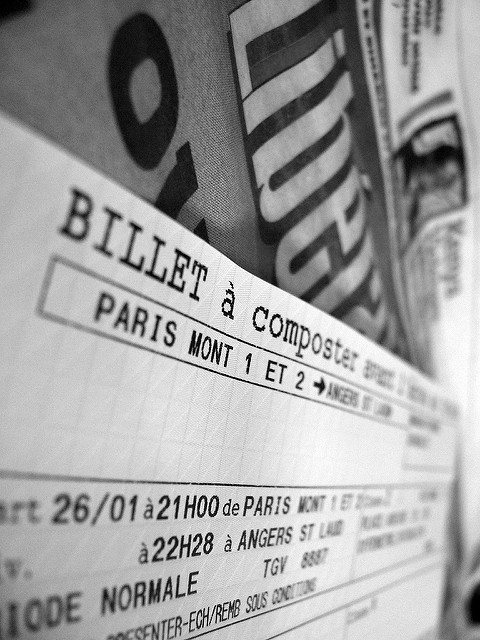Buying Billets Or Taking Tickets? – Confusing Words In French Posted by John Bauer on Aug 23, 2017 in Vocabulary
There are some words in French that I have a hard time understanding when to use. These are the kind of words that lead to les fautes (mistakes) from thinking in English. Learning how to use les mots (words) that don’t exist in English is one of the hardest parts about learning le vocabulaire (vocabulary).
Two words that I have trouble understanding when to use in French are le billet and le ticket. They both generally mean ticket, but it sometimes feels like les deux mots (the two words) are used randomly for different kinds of tickets. Par exemple (for example), if you use le billet when you should use le ticket or le ticket when you should use le billet, you will generally still be understood, but it will sound strange to French speakers.
It’s hard to appreciate how saying something that can be understood can still feel wrong to a native speaker, but it would be like someone using the word loafers to refer to any type of shoe in English. Imagine a French person pointing to their new running shoes and calling them loafers to get an idea of how silly these mistakes can sound.
In searching for a definition of les deux mots, I found many people, even native French speakers, are sometimes confused as to what exactly the difference is between le ticket and le billet. There seems to be an idea that le billet is more personnel (personal) and le ticket is more automatique (automatic).
Malheuresement (unfortunately), the idea of one word being plus personnel and the other being plus automatique doesn’t really help me understand the difference any better. Cependant (however), one source gave a nice and clear definition:
Un ticket est un billet imprimé de petite taille. Le mot est anglais mais venu du vieux français étiquette.
A ticket is a printed billet of small size. The word is English, but comes from the old French étiquette (label, tag).
Le billet possède un sens plus général, et inclut le ticket et le coupon, qui sont des sortes particulières de billets.
A billet has a more general sense and includes both tickets and coupons, which are specific kinds of billets.
It is an all squares are rectangles, but not all rectangles are squares situation. Le billet is the general word for tickets and le ticket is generally a specific kind of ticket.
While knowing the definition helps to understand the difference between les deux mots, it doesn’t help you know when to use them. En pratique (in practice), it unfortunately comes down to memorizing when to use le ticket and when to use le billet.
If you find yourself about to buy a ticket in la Francophonie and you are not sure if you should use le billet ou le ticket, don’t be afraid to say the wrong thing and learn from your mistakes!
Voici (here’s) a short list of when les deux mots are used:
Le ticket :
Ticket de caisse – Receipt
Ticket de quai – Platform Ticket
Ticket d’entrée – Entrance Ticket
Ticket de loterie – Lottery Ticket
Ticket de bus – Bus Ticket
Ticket de métro – Subway Ticket
Ticket parking – Parking Ticket (for a paid parking lot)
Le billet :
Billet de train – Train Ticket
Billet de théâtre – Theater Ticket
Billet de concert – Concert Ticket
Billet de banque – Bank Note
Billet d’avion – Plane Ticket
Billet de bateau – Boat Ticket
Billet d’entrée – Entrance Ticket (for Museums and historical sites)

Build vocabulary, practice pronunciation, and more with Transparent Language Online. Available anytime, anywhere, on any device.





Comments:
Françoise Desagnat:
“J’ai un ticket avec elle” ne signifie pas que vous avez un billet pour deux…pas du tout ! Cela veut dire “je crois bien que je lui plais”.?